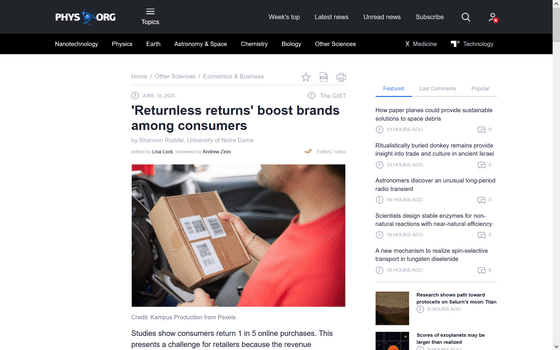Survey results show that 'no need to return the product' return policy enhances the brand power of shopping sites

When returning an item purchased on a shopping site, you may sometimes be told to 'please continue to use the item as is.' Surveys have revealed that shopping sites that have this type of return policy tend to be more popular with users and tend to be used for a longer period of time than other sites.
EXPRESS: Just Keep It: When and Why Returnless Product Returns Foster Brand Support - JOHN P. COSTELLO, CHRISTOPHER J. BECHLER, 2025
'Returnless returns' boost brands among consumers
https://phys.org/news/2025-06-returnless-boost-brands-consumers.html

The reason retailers offer 'no returns' is because the revenue they make from reselling the product often doesn't cover the costs of processing returns. As a result, some shopping sites offer a 'full refund + no returns' approach to refunds from users.
Research shows that consumers return as many as one in five items they purchase online, making returns a major challenge for retailers.
A 2023 survey of more than 500 retail executives found that to handle this growing number of returns, 59% have adopted a no-returns policy, up from 26% the year before.

We found that such return policies not only minimize costs for retailers, but also strengthen the retailer's brand.
According to several studies compiled by John Costello of the University of Notre Dame and others, consumers who have experienced a no-returns policy have higher ratings for retailers that do not require returns and are more likely to share positive reviews than those who are told to return the products.
We found that this tendency was strongest in situations that were as convenient for consumers as possible, where there was no need to prove whether the product met the return requirements, such as whether it was defective, and where the customer felt that the service was tailored to them as an individual, rather than a generalized service.
For example, consumers are likely to be delighted if they receive an email that says, 'Our primary goal is to make life better for our customers. With that in mind, you do not need to return your product for a refund. We appreciate your understanding and want to make this process as smooth and positive as possible, so please feel free to dispose of your product as you wish.'

Additionally, it has been found that the positive experience gained through a return policy can sometimes be greater than if the consumer had been satisfied with the product and not returned it.
Consumer psychology was similar in both cases where no return was required and they received a refund, as well as where no return was required and they received a replacement product, tending to make them feel more 'warm' towards the retailer's brand.
'Based on this research, it's likely that it would actually be more effective to offer no-return policies on a case-by-case basis,' Costello said. 'Consumers feel more positive when they receive special treatment or when they receive human interaction rather than automated emails, so it's beneficial to offer a 'human touch.''
Related Posts:
in Web Service, Posted by log1p_kr







